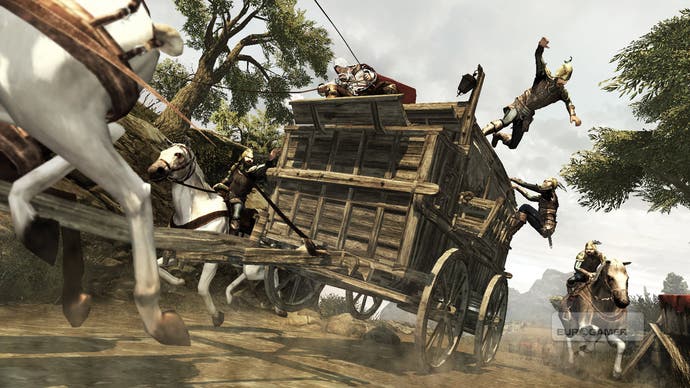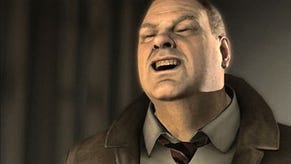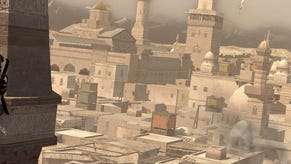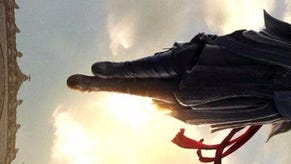Assassin's Creed II
Past master.
"Nothing is true," said Al Mualim. "Everything is permitted." The point of Assassin's Creed - apart from establishing a hugely successful new IP for Ubisoft - was to avoid taking the old man's words literally, and to begin with you may wish you'd done the same with the pre-release hype for the sequel.
For months we've been told that Assassin's Creed II will be much better because, not unlike Desmond Miles strapped to the curvy Animus machine, it will be defined by the lessons of its ancestor. Yet the sequel begins as messily as anything I can remember, as friendly lab-tech Lucy helps Desmond escape from the Abstergo facility where he's being held.
Abstergo, of course, is a futuristic front for the Templar Knights (do keep up), and she's busting him out so they can no longer use the Animus to ransack his genetic memories for the location of super-powerful objects called Pieces of Eden (seriously, keep up). Lucy and Desmond escape by running down corridors, doing clunky stealth and having an awful fight in a carpark. When they get where they're going, it turns out Lucy's fellow Assassins are rejects from Scooby Doo, who live in a snazzy loft conversion at a warehouse. And then they strap Desmond in an Animus anyway.
Desmond is reborn inside the Animus as another of his ancestors, Ezio Auditore, who lived in Florence in the 15th century, and your first experience of him is as a baby in his father's arms, wiggling your legs, arms and head to make sure you remember how the slightly pretentious "marionette" control system is laid out.

Once you're done as a baby, the game nannies you through several hours of awkward tutorials, falteringly entwined with scripted sequences built to establish Ezio. When the young nobleman - not yet an assassin - and his brother sit down on top of a Florentine church and the Assassin's Creed II title card appears suspended in the sky, it's evidently meant to be a well-placed breather during a classy opening, and yet it falls flat.
But things quickly improve. For a start, Assassin's Creed II is freed from the burden of narrative expectation, because there's no longer any mystery about those weird graphical effects in the Middle Ages. We know you're a man in a machine, there's a war between Assassins and Templars, and the Templars want Pieces of Eden so they can enslave humanity. There's still lots more to find out, but once you've met Freddie and Velma (or whoever they are) you won't be so bothered about that, so the game has to stand on its own merits.
So it does. You're still an assassin, of course. You still plan for kills by completing little missions within huge cities, and you still spend most of your time clambering over rooftops using a parkour-inspired platform move-set. You get a few new attacks, the range of possible assassinations is better defined, and you learn a new platforming trick or two, but your actions are rarely different to Altair's in the first game. The difference is that the sequel puts them to proper use.









